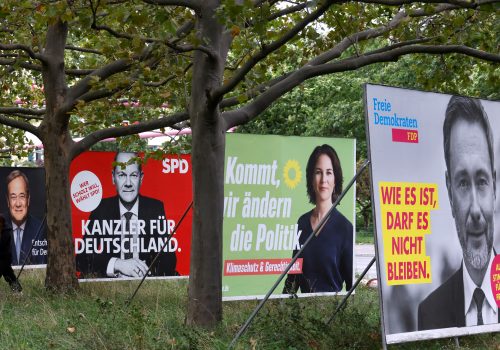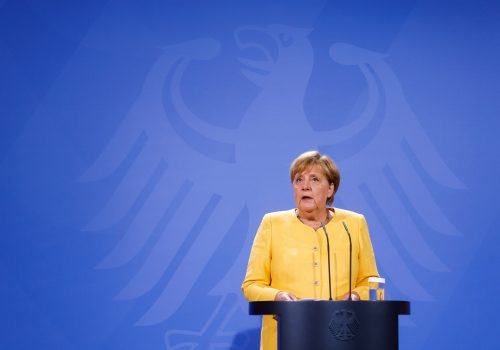FAST THINKING: Germany’s ‘messy’ post-Merkel moment
GET UP TO SPEED
Now comes the hard part. Germany’s Social Democratic Party (SPD) topped outgoing Chancellor Angela Merkel’s long-reigning Christian Democratic Union (CDU) in federal elections on Sunday. While the margin wasn’t huge—the left-leaning SPD took 25.7 percent of the vote relative to the conservative CDU’s 24.1 percent—it was the latter party’s worst performance ever, and sets the stage for protracted coalition negotiations (which we mapped out before the vote) that could lead to the country’s first three-party ruling partnership. So what could Germany’s next government look like? And what will it mean for Europe and the wider world? Our experts capture the zeitgeist.
TODAY’S EXPERT REACTION COURTESY OF
- Sophia Besch (@SophiaBesch): Nonresident senior fellow at the Europe Center
- Jörn Fleck: Deputy director of the Europe Center
Watch our experts break down the elections here
Coalition-cobbling
- This race “was a fight for the center” rather than a competition among parties, Sophia tells us, with each party “all pitching their next Merkel,” she says.
- And while the SPD’s Olaf Scholz ultimately came out on top, he probably won’t slide into the chancellery with ease, Jörn says. Nor will CDU chief Armin Laschet, who’s staking his own claim to the chancellor’s post partly to avoid leadership challenges from within his party. More than anything else, the results make the left-of-center Green Party, which secured around 14.8 percent of the vote, and the pro-business Free Democrats (FDP), with 11.5 percent, “the new kingmakers,” Jörn adds. They’ll likely create either a left- or right-leaning coalition with the SPD or CDU, respectively.
- But getting there won’t be easy. As Jörn reminds us, players in each party will now make a series of calculations and compromises—both internally and externally. For instance, how much will a bruised CDU leader give up to keep his party in government? And could the SPD’s internal truce between Scholz, a centrist, and progressives fall apart if the party is forced to play ball with the FDP’s fiscal hawks? “The only thing that’s certain: This will be a protracted and messy process,” Jörn says.
Subscribe to Fast Thinking email alerts
Sign up to receive rapid insight in your inbox from Atlantic Council experts on global events as they unfold.

Ground game
- That’s not necessarily a bad thing, Sophia contends. In their quest to cobble together a solid coalition, these parties will be forced to grapple with real political issues associated with their policy platforms. “During the electoral campaign, we talked about what the parties disagree [on]. Now they’re going to have to talk about what they agree on,” she says.
- The results of Sunday’s vote are also a reflection of Germany’s shifting political landscape, Sophia adds. The older voters who once bolstered the CDU—and who make up Germany’s most powerful voting bloc—have breathed new life into the SPD. Meanwhile younger voters are channeling their political clout through the Greens and FDP, which now “have a lot of influence over where the negotiations are going to go.”
Diplomatic dance
- Whatever happens in the coming days and weeks, policymakers on both sides of the Atlantic shouldn’t anticipate much from Europe’s economic powerhouse in the short term, Jörn believes: “Europe and the United States should expect to deal with a Germany distracted by the process of forming a government, unable to bring its full political and economic weight” to European Union deliberations.
- Over the longer term, Jörn adds, Berlin’s EU posture won’t change much regardless of the coalition that finally comprises the new government. “Given the pivotal role of the fiscal hawks of the FDP, hopes of major eurozone reforms and a loosening of debt and deficit rules seem misplaced,” he advises.
- Washington, though, might be pickier. Jörn thinks the United States would prefer a so-called “Jamaica” coalition (based on the parties’ colors): “a Green Party that drives a more hawkish stance on China and Russia, balanced by a CDU and FDP which firm up commitment to greater defense spending and [coordination on nuclear deterrence] in NATO.” For now, though, the world will have to live with uncertainty as Germany’s true colors come into focus.
Further reading
Fri, Sep 24, 2021
Coalition crazy: Here’s how Germany’s new government could shake out
New Atlanticist By Jörn Fleck
Germany's federal elections could send Europe’s largest economy into messy, months-long coalition negotiations.
Fri, Sep 3, 2021
Germany’s defense minister: Only political will can protect Europe
New Atlanticist By
The debate over EU security and defense should be about political will—not institutions.
Mon, Aug 23, 2021
The coming storm for a post-Merkel EU
New Atlanticist By
No matter who succeeds Angela Merkel as German chancellor, EU leaders are going to have to start making real decisions.
Image: Candidates for the Federal elections Armin Laschet, CDU, Olaf Scholz, SPD and Annalena Baerbock, Greens, pose for a photo, ahead of a TV talk show, in Berlin, Germany, September 19, 2021. Photo by Michele Tantussi/Reuters.


